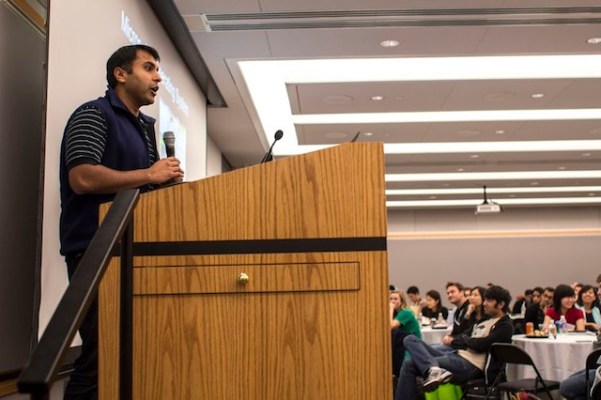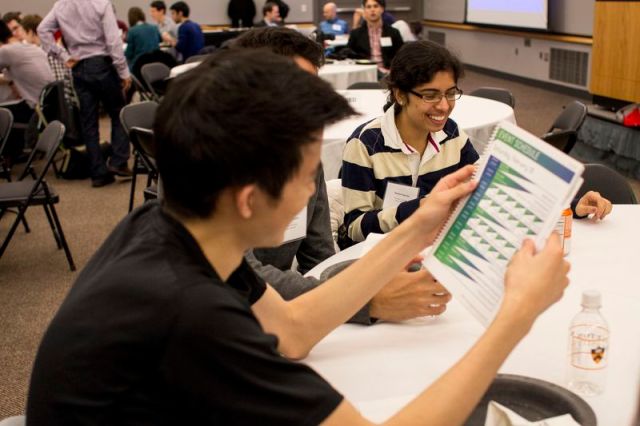Sequoia Capital and the student-run Princeton publication Business Today held their first Start @ A Startup conference this weekend, where more than 100 students (largely, but not entirely, from Ivy League schools) were recruited to join the startup world.
At least that’s the broad outline that Sequoia partner Bryan Schreier and Dropbox vice president Sujay Jaswa (Jaswa is the one speaking in the photo above) gave me when I interviewed them before the conference. The event itself (I was around for the first of the two days) turned out to be more varied — yes, it was partly a recruiting drive, but it was also an opportunity for startup founders to tell their stories, and for students to ask pretty much anything they wanted.
Schreier and Jaswa kicked things off, giving back-to-back talks in the basement of Princeton’s Frist Campus Center — Schreier described it as “the nicest basement you could possibly envision.” His talk covered a lot of the same ground as our earlier discussion, making the argument that too many Ivy League graduates end up going to work for investment banks and other large companies because that seems like the natural thing to do, when they could advance their careers more quickly if they went to a startup.
Schreier went into more detail about his personal experiences going from Morgan Stanley to Google to Sequoia. He said it was probably too harsh to call going to a Morgan Stanley after college a “mistake,” but he showed off a chart with the “deceleration and acceleration points” in his career, and indeed, his years in the financial industry were pretty static, at least from a job title perspective. Things picked up quickly when he joined Google. Schreier also offered a little more context around the rather eye-opening statistic that 41 percent of Stanford’s computer science graduates go to work for a startup after graduation, while the number is only 13 percent at Harvard. Turns out he cited Harvard specifically because it has the lowest number of the top-tier East Coast schools, with most Ivys hovering around 20 percent. (The numbers were based on LinkedIn profiles, he said.)
One obvious concern with going to work at a startup is the fact that the vast majority of them will fail. Schreier said that Sequoia’s portfolio companies, on the other hand, are successful more than 50 percent of the time, so he suggested the students can use the Sequoia website as a “cheat sheet” for which companies to work for. And anyway, he noted that the unemployment rate for software engineers is currently 2.3 percent, compared to the current U.S. unemployment rate of 8 percent (and the theoretical “natural” rate of 5.5 percent), so even if you join a startup that goes out of business, not only will you learn a lot, but “you’re so damn employable you don’t have anything to worry about.”
Jaswa made similar points, saying that working at a startup allows you to work with “the most brilliant people” in the world and to solve difficult problems in creative ways, because there’s no one else around to solve them: “If you’re the kind of person that wants to be challenged, that wants to be pushed, if you want to play the game, you have to go to a company that’s growing really fast.”
For me, the best part of the event was the opportunity to hear about the very early days of a few companies — these were mostly stories that had been told before, but the founders told them in a particularly relaxed and candid way. (The fact that I was the only reporter at the event, and that some of the speakers didn’t know I was there until I introduced myself, probably had something to do with it.)
For example, Keller Rinaudo, CEO and founder of iPhone-powered robot-maker Romotive, talked about how the team stayed up for days in order to put together the company’s first batch of robots. At one point they sent Jen McCabe (who’s officially in charge of customer development, but, hey, startups!) on a late-night run to Walmart to pick up a sewing machine in order to attach one of the needed parts. (Afterwards, McCabe told me that the sewing method didn’t work out.)
Rinaudo also recalled some of the things that the company learned from its early customers. He said he was shocked when many of them didn’t realize that they had to turn their robots on before they would work — Apple has trained us to expect always-on devices, so Rinaudo realized that Romotive had to do more to highlight the on-off switch for customers.
As Romotive works through its early kinks, Rinaudo said, “We got away with a lot because we’re a team of young people that people wanted to believe in.”
McCabe added that until you have an awesome product that people love (and she said Romotive still isn’t quite there yet), “Your company is the product you’re selling.”
Daniel Gross, co-founder and CEO of smart calendar startup Cue, had a scary-but-impressive story about joining Y Combinator and working for several months on one project, only to have it fall apart after Amazon changed its terms of service in a way that basically made his product illegal. With only 72 hours until Demo Day, Gross met with YC’s Paul Graham, who told him that he had three options — demo the old product without mentioning the TOS change until later, go home and maybe try again later, or whip up something new in the intervening time and hope that no one figured out it had been put together in a couple of days. Gross went with the third option, and he seemed to pull it off, creating what was then called Greplin.
Gross quickly recounted the company’s progress since then (something he also attributed to his co-founder Robby Walker), and he said the big takeaway was the fact that at a big company, you have to deal with a lot of “process” that can stand in the way of the work itself, while at a startup, “You get to be the owner of your own success and your own failure.”
Gross didn’t just rely on his own experience to make that point. He also offered a long list of engineers whose talent was squandered until they joined a startup (though of course many of those companies are now way beyond the startup stage). For example, he talked about Jeff Dean, who worked at Digital Equipment Corporation but didn’t achieve his real potential until he moved to Google, where he became “arguably one of the most important engineers in the 20th and 21st centuries” by developing the BigTable, MapReduce, and Google File System technologies.
In addition to sitting in on some keynotes and panels, I also had a chance to talk to some of the students. Several of them were knowledgeable about and eager to join the startup world. In fact, the attendee from what may have been the most far-flung location, Oxford’s Christopher Pruijsen, has already worked for two startups — Letsgopublic.com (now Prizeo.com) and Letslunch.com — and part of the reason he attended was to meet potential partners for his own Launchpad Conference. So he’s not exactly someone who has to be convinced to work for a startup, but he did say he enjoyed the content and the opportunity to be a “fly on the wall” for other conversations.
Similarly, Columbia student Kaushik Tiwari told me that he’s already a part of Res. Inc, Columbia’s residential entrepeurship initiative. He said the weekend was “empowering”: “It was a wonderful initiative to ensure that talented people are not sucked into the vortex of big money but rather focus on the important things in life.”
Not that everything this weekend was an instance of preaching to the choir. The students certainly asked some skeptical and tough questions. (My favorite example: Rinaudo talked about how people had scoffed at Romotive and said that no one would be interested, and how Steve Wozniak had recounted hearing similar criticisms in the early days of Apple. Then one of the students pointed out that everyone remembers when the skeptics are wrong, but in fact they’re usually right.) But there’s clearly some startup love on these campuses, and with help, it will grow.
[photos by Jeremy Leibovitch, Graham Raubvogel, and Cody Powers]

